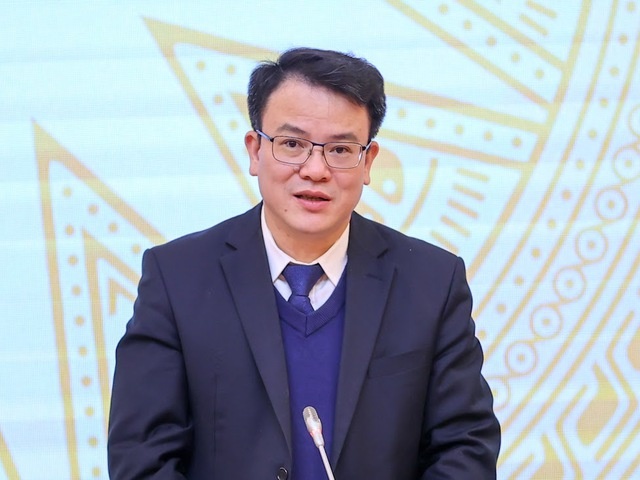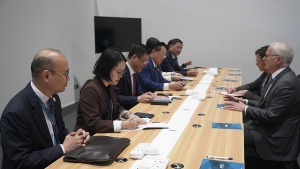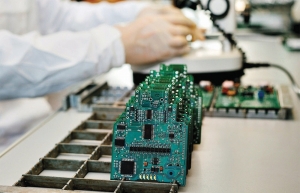Vietnam targets key sectors to cement status as prime investment destination
 |
Speaking at the monthly government press briefing on March 2, Phuong pinpointed these sectors as critical levers for securing investment, particularly in the technology sector.
“Our infrastructure is under intense scrutiny by investors, who expect high standards in land and transport facilities. To meet these expectations, we must fast-track our ongoing infrastructure initiatives,” he said.
With the Land Law enacted at the start of 2024, Vietnam aims to resolve existing bottlenecks and boost investment attractiveness in real estate. The deputy minister emphasised the urgency of implementing guidelines to operationalise the law, in line with investor anticipations.
"As Vietnam eyes the burgeoning investment in semiconductors, the goal is to cultivate a 100,000-strong workforce of high-calibre, including 50,000 specialised semiconductor engineers," he said. "Investors demand a skilled workforce. While Vietnam benefits from a demographic dividend, the focus must shift to elevating the workforce's skill set and proficiency."
The Ministry of Planning and Investment (MPI) is poised to gather and incorporate stakeholder insights to finalise its proposal for the semiconductor development plan, with the aim of submitting it to the government in the first quarter of 2024.
This initiative is part of Vietnam's concerted push to meet its ambitious 2030 goals, which include cultivating a workforce of engineers adept in the entire spectrum of modern semiconductor design and production - from front-end to back-end processes.
Projected to reach fruition by 2045, this strategy positions Vietnam as an integral component of the global semiconductor industry's value chain, with a skilled contingent of engineers and experts poised to fulfill the qualitative and quantitative demands of the burgeoning Vietnamese semiconductor sector.
Institutional reform is seen as the final pillar, with Phuong acknowledging the positive impact of recent policy shifts on investor psyche.
Yet, he calls for deeper, more stimulating policies to support emerging sectors like high-tech and semiconductors.
"Our approach to policy design must be meticulous, ensuring we create an environment that's both attractive and conducive for foreign direct investment," he said.
Data from the MPI reveals a significant uptick in foreign investment, with nearly $4.3 billion recorded as of February 20, marking a 39 per cent increase on-year. New registrations have doubled to $3.6 billion, bolstered by a surge in new projects and substantial investment scales ranging between $400 million and $600 million.
"These figures underscore the enduring confidence of foreign investors in the Vietnamese market and herald a positive trajectory for economic growth," Phuong said.
Prime Minister Pham Minh Chinh has previously mandated a comprehensive strategy to attract and retain prestigious technology groups, deeming it crucial to this year's agenda and the broader term goals.
While Vietnam continues to draw heavyweight tech corporations from global powerhouses like the United States, South Korea, and Japan, industry specialists suggest that the nation has yet to fully leverage the shifting trends in capital flows, with high-quality human resources and enabling mechanisms cited as areas needing further development.
 | Vietnam proposes enhanced semiconductor cooperation with US industry leaders Vietnam's Minister of Industry and Trade Nguyen Hong Dien has proposed a range of initiatives to enhance cooperation in the semiconductor sector during discussions with John Neuffer, vice president of the US Semiconductor Industry Association (SIA). |
 | Chip training the hot new trend for 2024 The thirst for human resources in the semiconductor manufacturing industry has prompted many training institutions to open related majors before the 2024 enrolment season. |
| Policy advances applicable to semiconductor industry For years, Vietnam has been globally acknowledged as a nation of great potential for the advancement of the semiconductor chip industry, owing to its advantageous geographical position, political stability, and a reservoir of high-quality human resources. |
| Vietnam can become major semiconductor player During VinFuture Prize 2023, Dr. Sadasivan Shankar, research technology manager at SLAC National Laboratory and Adjunct Professor in Stanford Materials Science and Engineering, spoke with VIR’s Tuan Minh about his insights into Vietnam’s chances in the semiconductor industry. |
What the stars mean:
★ Poor ★ ★ Promising ★★★ Good ★★★★ Very good ★★★★★ Exceptional
 Tag:
Tag:
Related Contents
Latest News
More News
- Kurz Vietnam expands Gia Lai factory (February 27, 2026 | 16:37)
- SK Innovation-led consortium wins $2.3 billion LNG project in Nghe An (February 25, 2026 | 07:56)
- THACO opens $70 million manufacturing complex in Danang (February 25, 2026 | 07:54)
- Phu Quoc International Airport expansion approved to meet rising demand (February 24, 2026 | 10:00)
- Bac Giang International Logistics Centre faces land clearance barrier (February 24, 2026 | 08:00)
- Bright prospects abound in European investment (February 19, 2026 | 20:27)
- Internal strengths attest to commitment to progress (February 19, 2026 | 20:13)
- Vietnam, New Zealand seek level-up in ties (February 19, 2026 | 18:06)
- Untapped potential in relations with Indonesia (February 19, 2026 | 17:56)
- German strengths match Vietnamese aspirations (February 19, 2026 | 17:40)





















 Mobile Version
Mobile Version